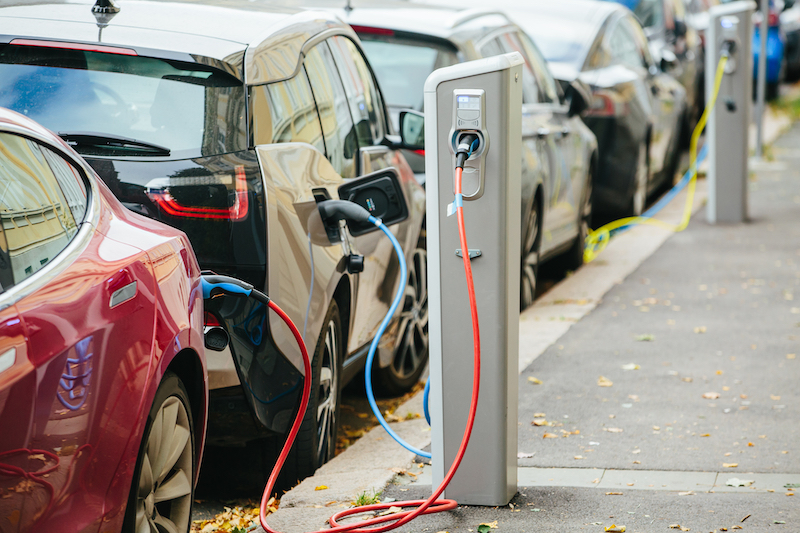Thinking about buying a car? Maybe you’re already weighing the pros and cons of buying a fully electric car, vs sticking with a traditional hybrid, plug-in hybrid, or gas-powered car.
In the process, you might face an even bigger decision—of whether you’ll drive off the lot in a new car that’s actually “new.”
At Lemonade car insurance, we want you to feel protected behind the wheel of a car that’s right for you. In some cases the best option might be a used vehicle, but there are some things you should know before you start shopping.
- When you’re deciding whether or not your next car should be fully electric, it’s important to consider what best fits your lifestyle, needs, and budget.
- Used EVs have cheaper upfront costs than new ones, and you could still be eligible for tax credits and manufacturer warranties, but you might face some battery degradation.
- Check out EV specific online tools to compare prices, ranges, and conditions.
- When shopping around for used EVs, ask the dealership or the previous owner directly about the battery efficiency and charging style.
Should I buy an electric vehicle?
If you’re considering an electric vehicle (EV), you’ve probably already asked questions like:
- How will I charge the car’s battery pack? (Hint: you might need a 240-volt outlet)
- What kind of range will I need my car to have, based on where the closest public charging stations are?
- Which tax credits could help lower the upfront costs?
Bottom line—you’ll need to decide what best fits your lifestyle, needs, and budget. An EV will likely help you save on maintenance costs, but may come with a heftier upfront price tag. Insurance may also be more expensive. But the upside is a vehicle that gets you from point A to point B, comfortably and quickly, without wrecking the planet.
Want to go green, but not ready to take the plunge for a fully electric vehicle? A hybrid car might be the way to go. Check out the pros and cons of driving a traditional and plug-in version here.
Should I buy a new or used electric car?
If you’ve decided that buying an electric car is the right move, ask yourself if a new or used one is the best fit.
Some of the factors to consider:
- Upfront and maintenance costs
- Your comfort level with buying used (and how much you trust the seller)
- The type of car you’re looking to buy—like a sedan, hatchback, SUV, or pickup truck
- Total mileage
- Battery pack’s age and condition
- Fuel economy / range
Under some categories—especially upfront costs—a used EV could be better for your budget.
Used EVs are cheaper
It’s no surprise that buying a used electric car will be cheaper than buying a new electric car.
Here are a few popular models, along with their price ranges according to Kelley Blue Book in Dallas:
- 2020 Chevrolet Bolt EV: $25,044 to $27,234
- 2020 Hyundai Kona EV: $26,892 to $30,169
- 2019 Tesla Model 3: $36,803 to $41,516
- 2019 BMW i3: $28,469 to $31,763
Used EV tax credits are available
Some of the federal tax credits and rebates that make electric cars an appealing option for drivers may also be available for used electric cars too. If you’re in the market for a used EV, you could be eligible for up to $4,000 in rebate incentives for some used EV purchases with a used clean vehicle credit. Your eligibility (and how much you could be eligible for) depends on certain factors—including the car model (it will need to have been assembled in North America), your income, and the price of the car.
Check out the requirements and potential benefits of a used clean vehicle credit here.
But, you might face some battery degradation
It’s not just likely that an EV’s battery will degrade with time, it’s almost expected. Why? That’s just how batteries work. The typical temperature that the EV has been exposed to is a big factor; environments that are typically very hot or very cold can have an effect on the battery’s life.
The type of charging that’s regularly been used can be another factor. Cars only charged on a fast charger can have more severe battery degradation, while those charged using slower home chargers may not face as much degradation.
The amount of time since the battery was built is another factor in the way the battery will degrade. It’s an unfortunate truth, but one that’s worth considering if you’re thinking about buying a used electric vehicle.
How can I buy a used electric vehicle?

There are a few things to pay attention to when buying a used EV (or a new one, for that matter). Here are some steps you’ll want to follow.
Do your research
Hopefully, you’re confident that an EV is the right purchase for you, that you’ll have consistent access to chargers, and that the range fits your lifestyle (checking first that the closest public charging station isn’t 300 miles from your front door).
You’ll want to do some research on the car itself, the way you would for any other major purchase. Look up reviews of the make and model, and do some homework on the price you’ll pay using Kelley Blue Book or other online pricing tools.
- MyEV.com is another great place to do more research, and lists prices, ranges, and comparisons
- If you want to know more about how a prospective EV will stack up to other cars in efficiency, checking out Greenercars.com can give some perspective
Next, do a bit of research on factors that could affect the battery degrading, like running the Carfax report to see if it was registered in a state that’s excessively hot or cold.
Also, if you’re buying a used EV directly from the previous owner, ask them about their EV charging style. Did they usually opt for slow or fast charging? Would they just plug it in until it’s between 20% and 80% charged, or go for a full charge every time? It’s important to know, because consistently fast charging and charging past 80%, or continuing to drive when it’s under 20%, can deplete an EV battery faster.
Compare EV warranties
It’s especially important to consider manufacturer warranties when buying an electric vehicle. The same holds true if you’re considering a used one.
US federal law requires all car manufacturers to warranty EV batteries for at least eight years or 100,000 miles, whichever comes first. If the used car you purchased isn’t more than eight years old, or doesn’t have more than 100,000 miles on the odometer, that warranty would likely carry over.
Some car manufacturers, like Tesla, take protection a step further for used EVs, offering a used vehicle limited warranty for certain models.
Take a test drive
Lastly, if you haven’t driven the car you’re considering, make it a point to take one for a spin before buying. Sure, that’s old car-buying advice, but there’s a reason that it’s still true. You should get a feeling for the car before you take the plunge.
If you’re buying online, test drive a similar model at a dealership first to get a feel for it. Drive it the way you normally would, and make sure that you like the way it handles.
Get the right insurance…
Research shouldn’t stop at the dealership when you’re buying a car. It’s also a good idea to see how much you’ll pay for car insurance coverage.
Wondering how to shop around for car insurance quotes? Check out our guide on how to build and compare quotes to insure your new-to-you electric car.
Pay attention to the amount of coverage, and look for discounts that might come with your new or used EV. At Lemonade Car, we have the right insurance for your electric car, offering EV drivers bonus discounts and perks—like extra coverages for your home charging station or a portable charger.
A few quick words, because we <3 our lawyers: This post is general in nature, and any statement in it doesn’t alter the terms, conditions, exclusions, or limitations of policies issued by Lemonade, which differ according to your state of residence. You’re encouraged to discuss your specific circumstances with your own professional advisors. The purpose of this post is merely to provide you with info and insights you can use to make such discussions more productive! Naturally, all comments by, or references to, third parties represent their own views, and Lemonade assumes no responsibility for them. Coverage may not be available in all states.





